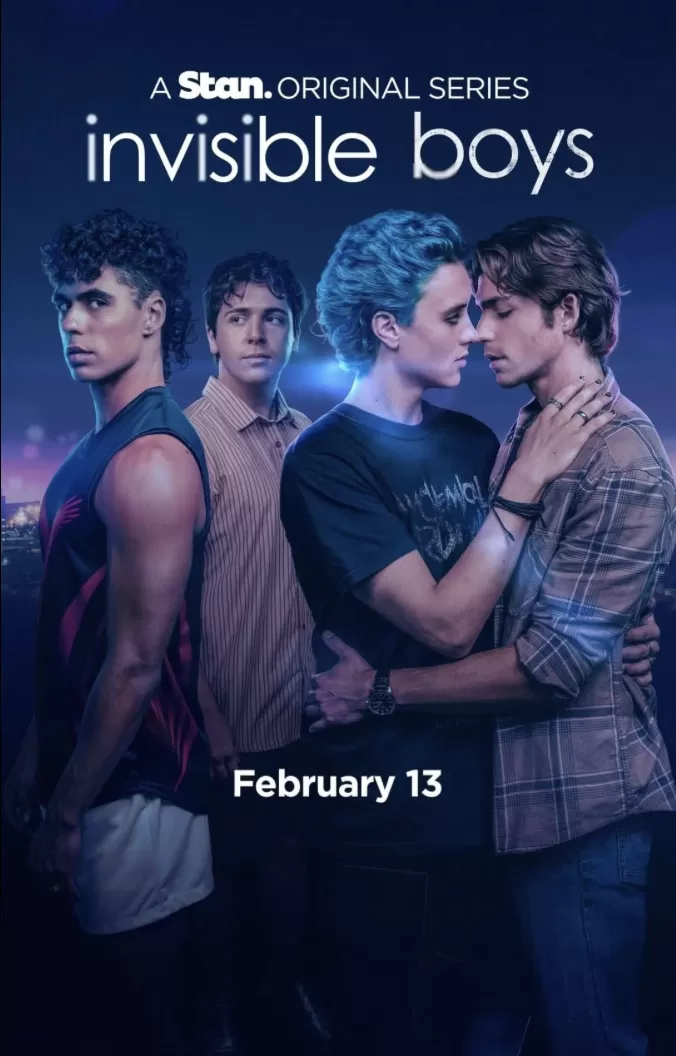
This Australian coming-of-age series centers on gay men and their longing to be acknowledged by others. Set in the small, remote town of Geraldton during the time of the same-sex marriage vote in Australia, it delves into the emotions and experiences of its characters with raw honesty and authenticity. The series primarily focuses on teenage boys, and as they form close-knit friendships, they find comfort and strength in each other, navigating their desires and identities in a society that often marginalizes them. With 10 episodes, each lasting 30 minutes, the show left a lasting impact on me in various ways.
The story begins with Charlie, a rebellious teenager who seems unconcerned with anything, including the fact that his hair remains uncolored despite his desire to leave town. He hasn’t even confided in his best friend about his sexuality, but when a hookup with an older married man goes awry, he comes out on Facebook Live. We also meet Zeke, the younger of two siblings from an Italian family, who is constantly bullied by the school jock, Hammer. Despite Zeke’s efforts to remain unnoticed, including deleting his internet history to keep it hidden from his overbearing mother, Hammer relentlessly targets him with cruel slurs. Hammer’s own mother is also controlling, constantly reminding him that, as a black man, he must surpass everyone else. What no one, including Hammer himself, realizes is that he may be attracted to boys. His failed sexual encounter with his girlfriend sends him into a panic attack, and eventually, it becomes clear that Hammer may have feelings for Zeke, who is one of the kindest individuals he knows. Their complicated, on-again, off-again chemistry forms one of the central dynamics of the show. One night, when Charlie decides to run away, he encounters Matt, a more age-appropriate hookup who seems to have his life more together than the others. However, beneath the surface, his emotions are far more turbulent than they appear. A significant portion of the series focuses on the relationship between Charlie and Matt, both of whom carry emotional baggage that unfolds over the course of the show.
Each of these boys faces unique struggles, but they all share a common challenge: they are gay in a conservative, tightly-knit community that disapproves of homosexuality. The show dedicates an episode to each character, providing viewers with an intimate understanding of their motivations, struggles, and growth. The constant threat of violence or being exposed adds an undercurrent of tension that looms over the series. Each of the main characters is given depth, authenticity, and space to develop. Charlie’s insecurities are magnified by his on-and-off relationship with the increasingly enigmatic Matt. Zeke contends with his overbearing mother but finds support in a potential girlfriend and his sister-in-law, who helps him come out to his family. Hammer grapples with his emerging sexuality and the expectations placed on him by his family to pursue a career in national sports. In fact, Hammer’s budding romance with Zeke forms the heart of the series, echoing the emotional depth of Heartstopper but with a distinctly Australian flavor, filled with swearing and a much more explicit tone. The story does not offer a fairy-tale ending, however. The most poignant character is Matt, whose backstory we only fully learn in the ninth episode. His loneliness and the depression he battles are impossible to forget. While the series may seem to portray a bleak view of queer life, in my opinion, the creators have done an admirable job of presenting complex queer characters with love, honesty, and empathy—something we need to see more of in the media.
The four lead actors deliver outstanding performances, bringing real depth and complexity to their characters. The writing and acting deserve recognition for portraying queer characters with nuance, which is often lacking in similar shows. While some of the sex scenes may feel excessive or gratuitous, they also offer an authentic representation of the young gay experience that many viewers, myself included, can relate to. The supporting cast also shines, particularly Zeke’s mother. Her portrayal of Zeke’s racist, homophobic mother is infuriating, even though her role feels somewhat predictable as a cartoonish villain. Ultimately, Invisible Boys is about the healing power of community and chosen family. There are truly heartfelt moments between these boys, who have found each other in what feels like an impossible situation, and an optimism that they will ultimately find their path.





